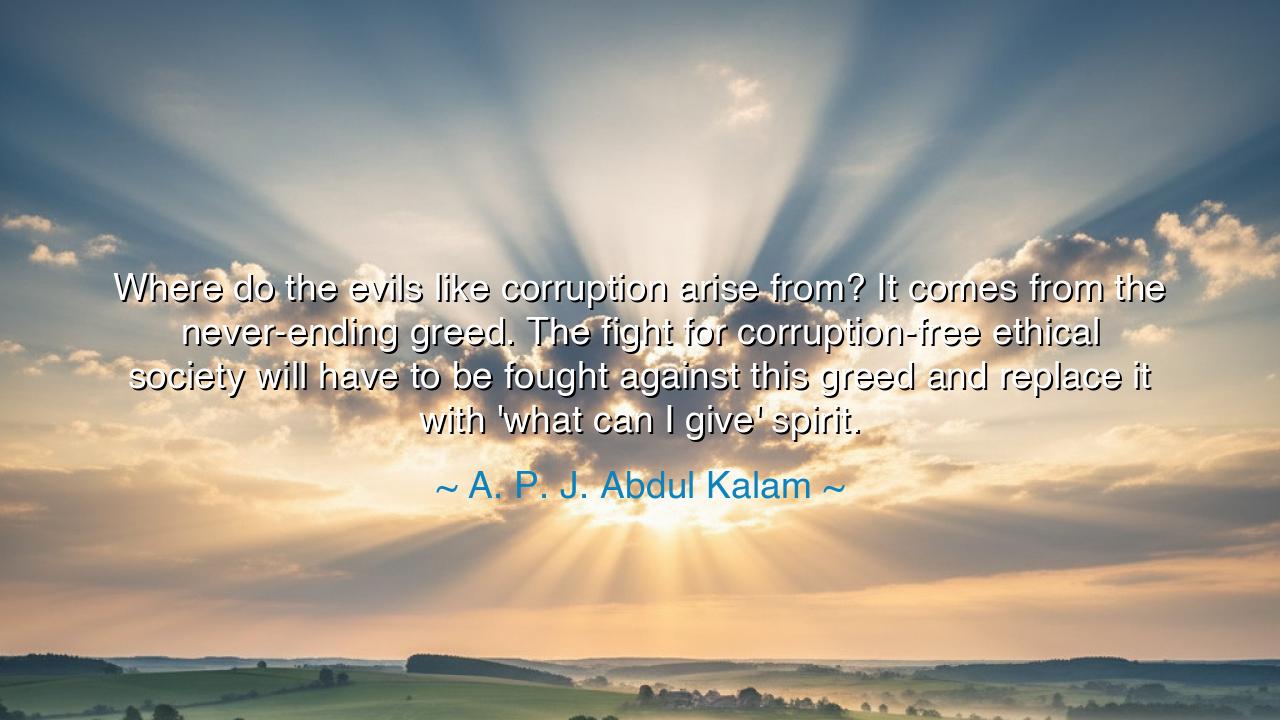
Where do the evils like corruption arise from? It comes from the
Where do the evils like corruption arise from? It comes from the never-ending greed. The fight for corruption-free ethical society will have to be fought against this greed and replace it with 'what can I give' spirit.






In the great expanse of human history, there are few forces more destructive than greed—the insatiable hunger for more that consumes the soul and corrupts the heart. The words of A. P. J. Abdul Kalam, “Where do the evils like corruption arise from? It comes from the never-ending greed. The fight for a corruption-free ethical society will have to be fought against this greed and replace it with ‘what can I give’ spirit,” strike at the very heart of this eternal truth. The battle against corruption is not simply a struggle against the powerful and the corrupt; it is a fight against the greed that resides within each of us, urging us to take, to hoard, and to conquer, rather than to give, to share, and to build.
Greed, dear listener, is the seed from which the most terrible evils grow. It is the root of corruption, the invisible thread that binds a society in shackles, pulling it deeper into decay. For when the desire for personal gain supersedes the well-being of others, the very structure of society begins to falter. Corruption becomes a cancer that spreads, not just through the institutions of government or business, but through the hearts of individuals. It is not simply the action of those in power who seek wealth, but the mindset that permeates all levels of society: the idea that to take is noble, that to acquire is the mark of success, and that self-interest should reign supreme.
Consider the tale of the great empires of old. From the riches of Rome to the wealth of Ming China, many empires fell not because of external forces, but because the seeds of greed were allowed to grow unchecked. The Roman Empire, for instance, was torn apart not by the swords of invaders but by the corruption within its own walls. The greed of the ruling class led to the exploitation of the common people, to bribery, to the selling of power for personal gain. The ethics that once held the empire together were slowly eroded, and in their place, greed took root, leading to the empire’s inevitable decline. This cycle of rise, decay, and fall has been witnessed throughout history, for corruption is as old as humanity itself, and it continues to haunt us today.
But Kalam gives us hope in his vision for the future. He calls upon us not simply to resist corruption, but to replace the very foundation of greed with a new spirit—the spirit of “what can I give?” This question is the opposite of the selfish hunger for more that fuels corruption. It is a question that asks us to look beyond ourselves, to ask how we might contribute to the greater good, to the well-being of others. This shift in mindset, this turning away from the self-centered pursuit of wealth, is the key to unlocking a truly ethical society.
The story of Mahatma Gandhi offers a powerful example of this spirit of giving. Gandhi, in his quest for Indian independence, understood that the true power of a society lies not in its wealth, but in its moral strength. He did not seek to enrich himself or his followers, but rather, he called for a return to simplicity, for each person to ask, "What can I give?" His famous salt march, where he led thousands to the sea to make salt in defiance of British laws, was not merely an act of political resistance; it was an embodiment of the spirit of giving. Gandhi’s leadership was based on the idea that when individuals act for the benefit of all, when they give freely and without expectation of return, they can change the very fabric of society. Through his life, he demonstrated that greed could be replaced with selflessness, and that this was the path to true freedom and justice.
The lesson, then, is profound and urgent. If we wish to build a corruption-free ethical society, we must first examine our own hearts. How often do we ask ourselves, “What can I give?” and how often do we think, “What can I take?” The battle against corruption is not simply a matter of enacting laws or holding the powerful accountable; it is a matter of shifting the collective mindset of society. It is a call to each individual to rise above the self-interest that has plagued humanity for so long and embrace the spirit of giving. This transformation begins within each of us, and it is through selfless action that we can create a world where greed no longer holds sway.
Let us take this message into our lives. Let us strive not to hoard, not to accumulate power for ourselves, but to serve, to give, to build. The greatest leaders, the heroes of history, are those who gave of themselves—whether through sacrifice, wisdom, or service. They understood that true greatness lies not in taking, but in giving. And as we move forward in the world, let us remember the words of A. P. J. Abdul Kalam, for the fight against greed and corruption begins not with the world, but within the hearts of each of us. Through selflessness, we can heal the wounds of our society and create a future where integrity, justice, and compassion reign supreme.






AAdministratorAdministrator
Welcome, honored guests. Please leave a comment, we will respond soon